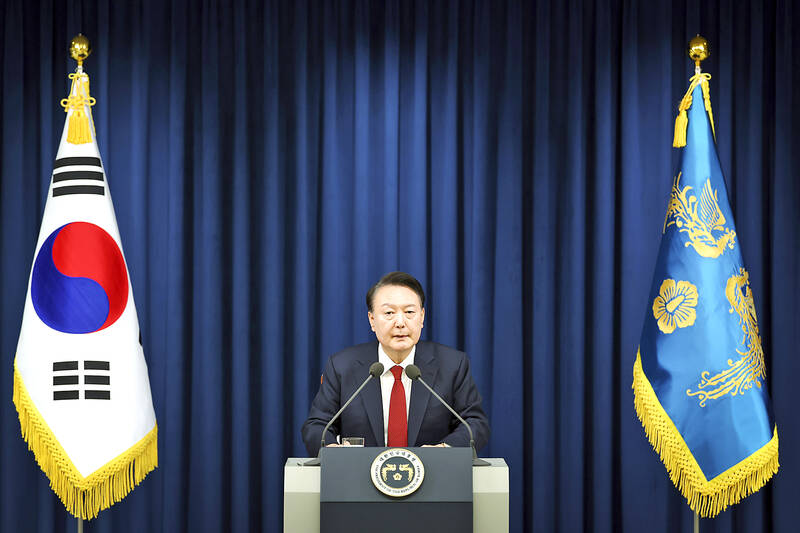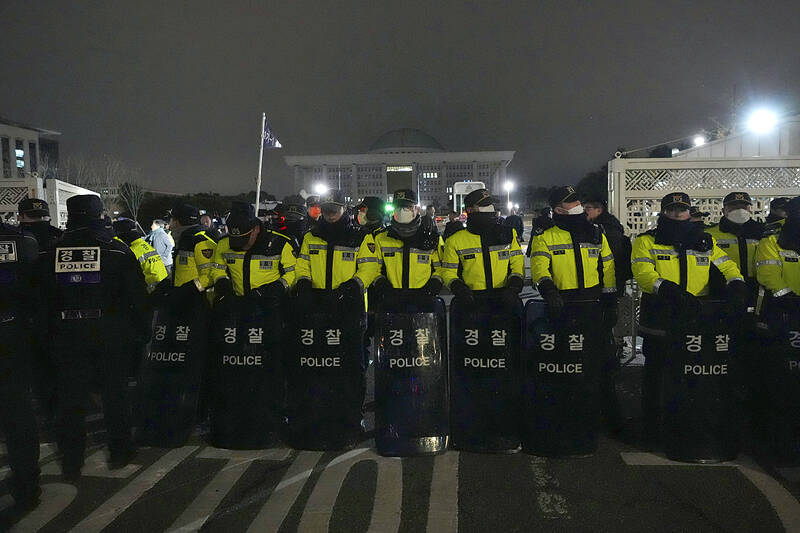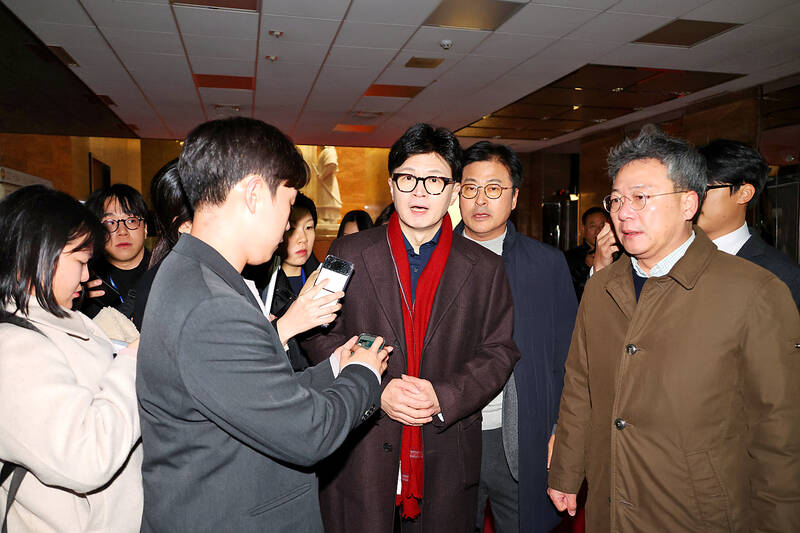South Korean President Yoon Suk-yeol yesterday declared emergency martial law, accusing the opposition of being “anti-state forces intent on overthrowing the regime” amid parliamentary wrangling over a budget bill.
“To safeguard a liberal South Korea from the threats posed by North Korea’s communist forces and to eliminate anti-state elements plundering people’s freedom and happiness, I hereby declare emergency martial law,” Yoon said in a live televised address to the nation.
“With no regard for the livelihoods of the people, the opposition party has paralysed governance solely for the sake of impeachments, special investigations, and shielding their leader from justice,” he added.

Photo: AP
The surprise move comes as Yoon’s People Power Party and the main opposition Democratic Party continue to bicker over next year’s budget bill. Opposition MPs last week approved a significantly downsized budget plan through a parliamentary committee.
The opposition has slashed approximately 4.1 trillion won (US$2.8 billion) from Yoon’s proposed 677 trillion won budget plan, cutting the government’s reserve fund and activity budgets for Yoon’s office, the prosecution, police and the state audit agency.
“Our National Assembly has become a haven for criminals, a den of legislative dictatorship that seeks to paralyze the judicial and administrative systems and overturn our liberal democratic order,” Yoon said.

Photo: AP
Yoon, a former prosecutor, accused opposition lawmakers of cutting “all key budgets essential to the nation’s core functions, such as combatting drug crimes and maintaining public security... turning the country into a drug haven and a state of public safety chaos.”
The president went on to label the opposition, which holds a majority in the 300-member parliament, as “anti-state forces intent on overthrowing the regime.”
Yoon described the imposition of martial law as “inevitable to guarantee the continuity of a liberal South Korea,” adding that it would not impact the country’s foreign policy.

Photo: EPA
“I will restore the country to normalcy by getting rid of anti-state forces as soon as possible,” he said, without elaborating further other than the martial law in place.
He described the current situation as South Korea “on the verge of collapse, with the National Assembly acting as a monster intent on bringing down liberal democracy.”
With martial law imposed, all military units in the South Korea, which remains technically at war with the nuclear-armed North Korea, have been ordered to strengthen their emergency alert and readiness postures, Yonhap news agency reported.
All political activities are banned in South Korea following the imposition of martial law and all media will be subject to government monitoring, martial law commander Park An-su said in a statement.
“All political activities, including those of the National Assembly, local councils, political parties, and political associations, as well as assemblies and demonstrations, are strictly prohibited,” he said, adding: “All media and publications shall be subject to the control of the Martial Law Command.”
The entrance to the National Assembly has been sealed, and MPs have been barred from entering the building, according to Yonhap.
Helicopters were seen landing on the roof of the building in Seoul, in live television footage aired by broadcasters.
South Korea’s opposition leader Lee Jae-myung denounced the newly imposed martial law as "illegal" and called on the public to gather at the parliament in protest.
"President Yoon Suk-yeol’s illegal imposition of martial law is invalid," Lee, who narrowly lost to Yoon in the 2022 election, said during a live stream. "Please come to the National Assembly now. I am heading there as well," he added, urging citizens to join him in opposing the martial law.
The imposition of emergency martial law comes as Yoon’s approval rating dropped to 19 percent in the latest Gallup poll last week, with many expressing dissatisfaction over his handling of the economy and controversies involving his wife, Kim Keon-hee.

The Taiwanese passport ranked 33rd in a global listing of passports by convenience this month, rising three places from last month’s ranking, but matching its position in January last year. The Henley Passport Index, an international ranking of passports by the number of designations its holder can travel to without a visa, showed that the Taiwan passport enables holders to travel to 139 countries and territories without a visa. Singapore’s passport was ranked the most powerful with visa-free access to 192 destinations out of 227, according to the index published on Tuesday by UK-based migration investment consultancy firm Henley and Partners. Japan’s and

NATIONAL SECURITY THREAT: An official said that Guan Guan’s comments had gone beyond the threshold of free speech, as she advocated for the destruction of the ROC China-born media influencer Guan Guan’s (關關) residency permit has been revoked for repeatedly posting pro-China content that threatens national security, the National Immigration Agency said yesterday. Guan Guan has said many controversial things in her videos posted to Douyin (抖音), including “the red flag will soon be painted all over Taiwan” and “Taiwan is an inseparable part of China,” while expressing hope for expedited “reunification.” The agency received multiple reports alleging that Guan Guan had advocated for armed reunification last year. After investigating, the agency last month issued a notice requiring her to appear and account for her actions. Guan Guan appeared as required,

Japan and the Philippines yesterday signed a defense pact that would allow the tax-free provision of ammunition, fuel, food and other necessities when their forces stage joint training to boost deterrence against China’s growing aggression in the region and to bolster their preparation for natural disasters. Japan has faced increasing political, trade and security tensions with China, which was angered by Japanese Prime Minister Sanae Takaichi’s remark that a Chinese attack on Taiwan would be a survival-threatening situation for Japan, triggering a military response. Japan and the Philippines have also had separate territorial conflicts with Beijing in the East and South China

A strong cold air mass is expected to arrive tonight, bringing a change in weather and a drop in temperature, the Central Weather Administration (CWA) said. The coldest time would be early on Thursday morning, with temperatures in some areas dipping as low as 8°C, it said. Daytime highs yesterday were 22°C to 24°C in northern and eastern Taiwan, and about 25°C to 28°C in the central and southern regions, it said. However, nighttime lows would dip to about 15°C to 16°C in central and northern Taiwan as well as the northeast, and 17°C to 19°C elsewhere, it said. Tropical Storm Nokaen, currently